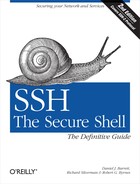The escape character is a tilde ~. With this you can escape metacharacters to
use them in their plain character form.
In the following examples literal E and F
denote any expression, whether a pattern or a character.
(Start a capturing subexpression.
)End a capturing subexpression.
{Start an anonymous, noncapturing subexpression.
}End an anonymous, noncapturing subexpression.
E|FDisjunction, match either
EorF(inclusive).Eis preferred if both match.E*Act as Kleene star, match
Ezero or more times.E*?Act as Kleene star, but match nongreedily (lazy match).
E+Closure, match E one or more times.
E+?Closure, but match non-greedily (lazy match).
E?Option, match E optionally once.
E??Option, but match non-greedily (lazy match).
.Match ANY character, including possibly the NULL byte and the newline characters.
E/n/Match
Eexactlyntimes.E/n,/orE/n,0/Match
Enor more times.E/,n/orE/0,n/Match
Eat mostntimes.E/n,m/Match
Eno less thanntimes and no more thanmtimes.E/n,/?,E/n,0/?,E/,n/?,E/0,n/?,E/n,m/?The lazy versions of above.
[Start a character set. See the section "Escaped Tokens for Regex Syntax SSH.”
>COne-character lookahead. ‘C’ must be either a literal character or parse as a character set. Match the empty string anywhere provided that the next character is ‘C’ or belongs to it.
<COne-character lookback. As above, but examine the previous character instead of the next character.
$Match the empty string at the end of the input.
^Match the empty string at the start of the input.
The following list describes the tokens:
~0n..nThe literal byte with octal value
n..n.~0The NULL byte.
~[1-9]..xThe literal byte with decimal value
~[1-9]..x.~xn..nor~0xn..nThe literal byte with hexadecimal value
n..n.~<Match the empty string at the beginning of a word.
~>Match the empty string at the end of a word.
~bMatch the empty string at a word boundary.
~BMatch the empty string provided it is not at a word boundary.
~dMatch any digit, equivalent to [0:9].
~DMatch any character except a digit.
~sMatch a whitespace character (matches space, newline, line feed, carriage return, tab, and vertical tab).
~SMatch a nonwhitespace character.
~wMatch a word-constituent character, equivalent to [a:zA:Z0:9-].
~WMatch a non-word-constituent character.
~aLiteral alarm character.
~eLiteral escape character.
~fLiteral line feed.
~nLiteral newline, equivalent to C’s
~rLiteral carriage return.
~tLiteral tab.
All other escaped characters denote the literal character itself.
A character set starts with '[' and ends at non-escaped ]' that is not part of a POSIX character set
specifier and that does not follow immediately after '['.
The following characters have a special meaning and need to be escaped if meant literally:
:A range operator, except immediately after
[, where it loses its special meaning.-(minus sign)Until next +, the characters, ranges, and sets will be subtracted from the current set instead of being added. If appears as the first character after
[, start subtracting from a set containing all characters instead of the empty set.Until next -, the characters, ranges, and sets will be added to the current set. This is the default.
[:alnum:]Characters for which
isalnumreturnstrue(see ctype.h).[:alpha:]Characters for which
isalphareturnstrue(see ctype.h).[:cntrl:]Characters for which
iscntrlreturnstrue(see ctype.h).[:digit:]Characters for which
isdigitreturnstrue(see ctype.h).[:graph:]Characters for which
isgraphreturnstrue(see ctype.h).[:lower:]Characters for which
islowerreturnstrue(see ctype.h).[:print:]Characters for which
isprintreturnstrue(see ctype.h).[:punct:]Characters for which
ispunctreturnstrue(see ctype.h).[:space:]Characters for which
isspacereturnstrue(see ctype.h).[:upper:]Characters for which
isupperreturnstrue(see ctype.h).[:xdigit:]Characters for which
isxdigitreturnstrue(see ctype.h).
It is also possible to include the predefined escaped character sets into a newly defined one, so:
[~d~s]
matches digits and whitespace characters.
Also, escape sequences resulting in literals work inside character sets.
